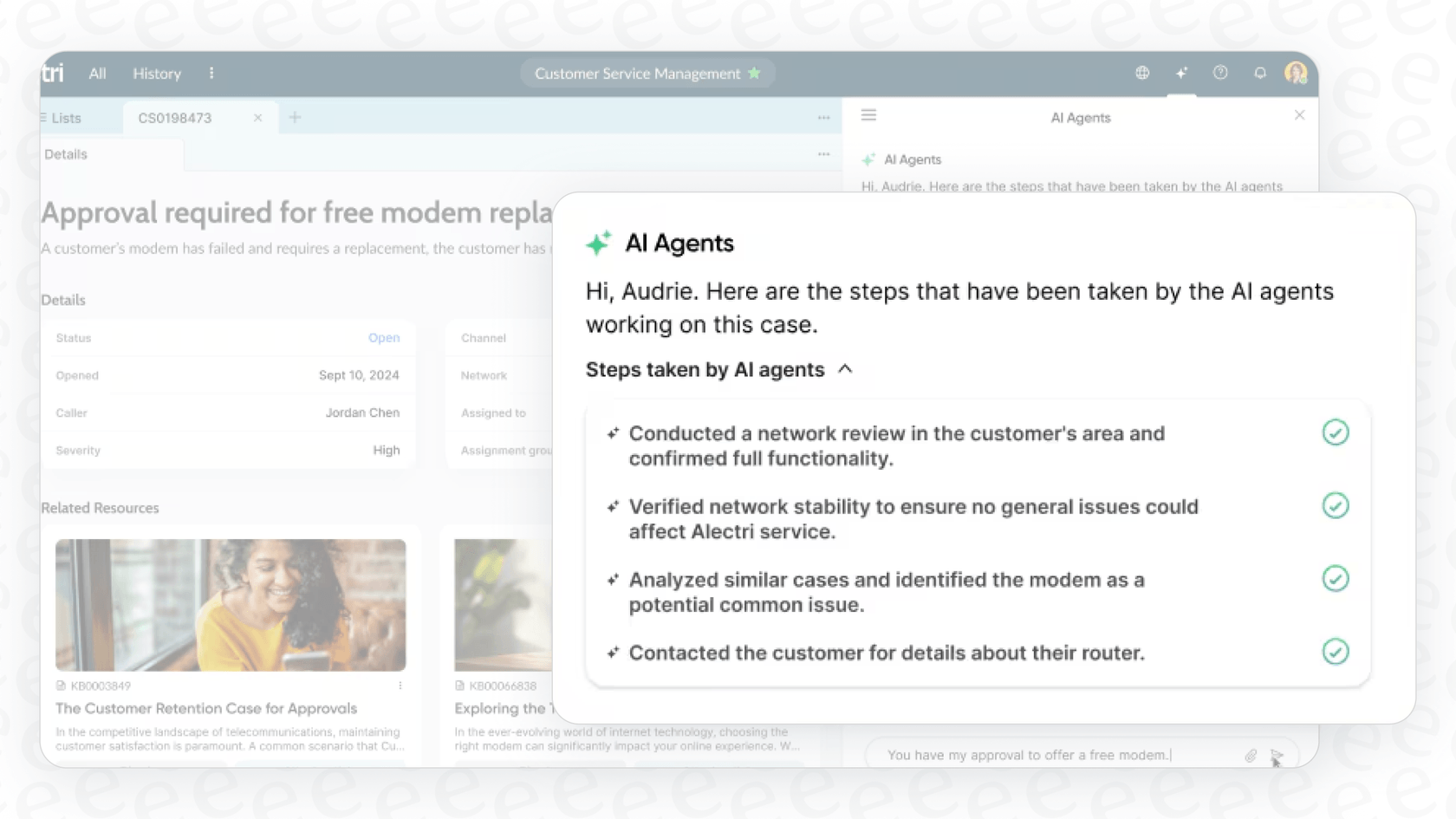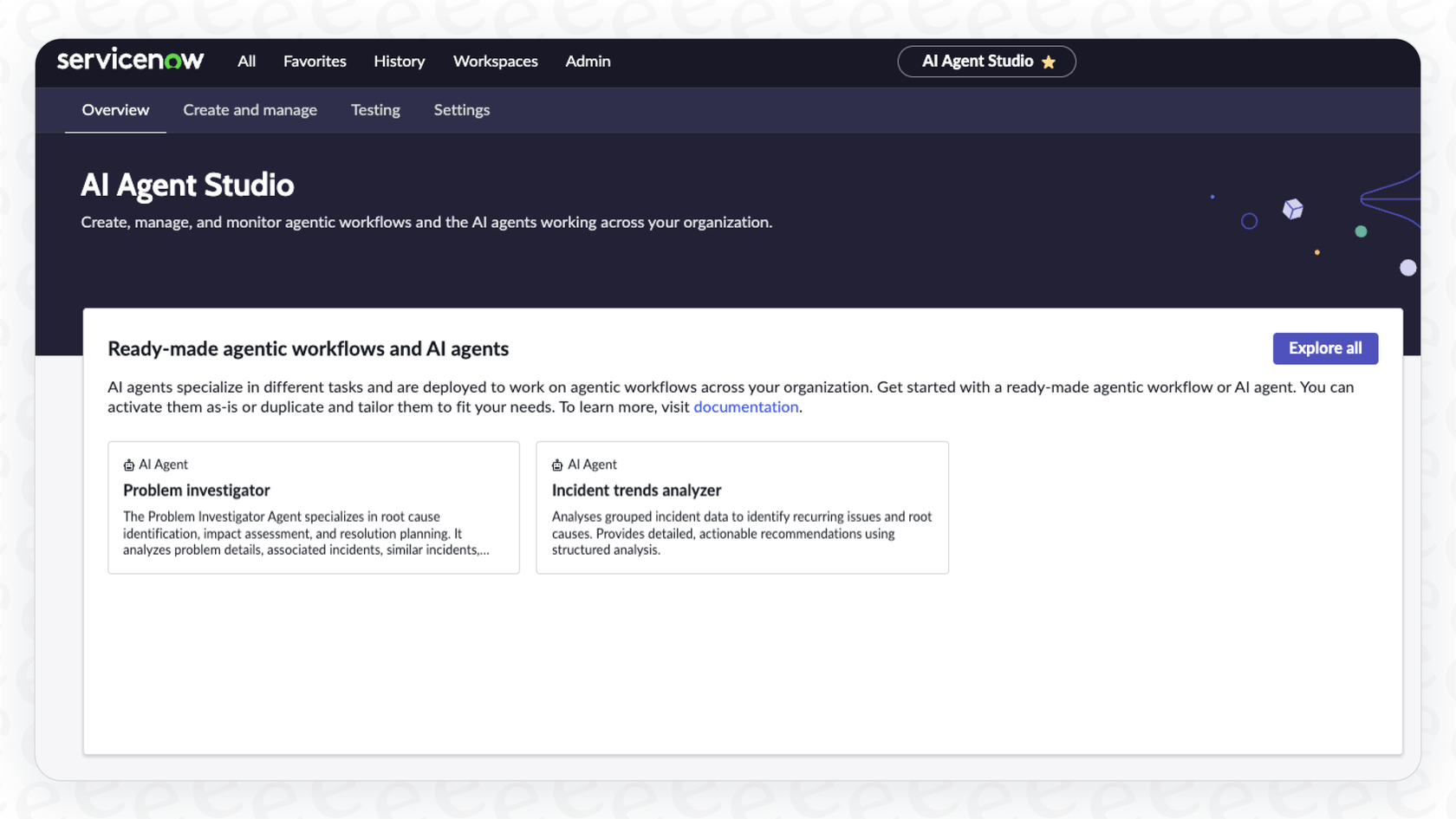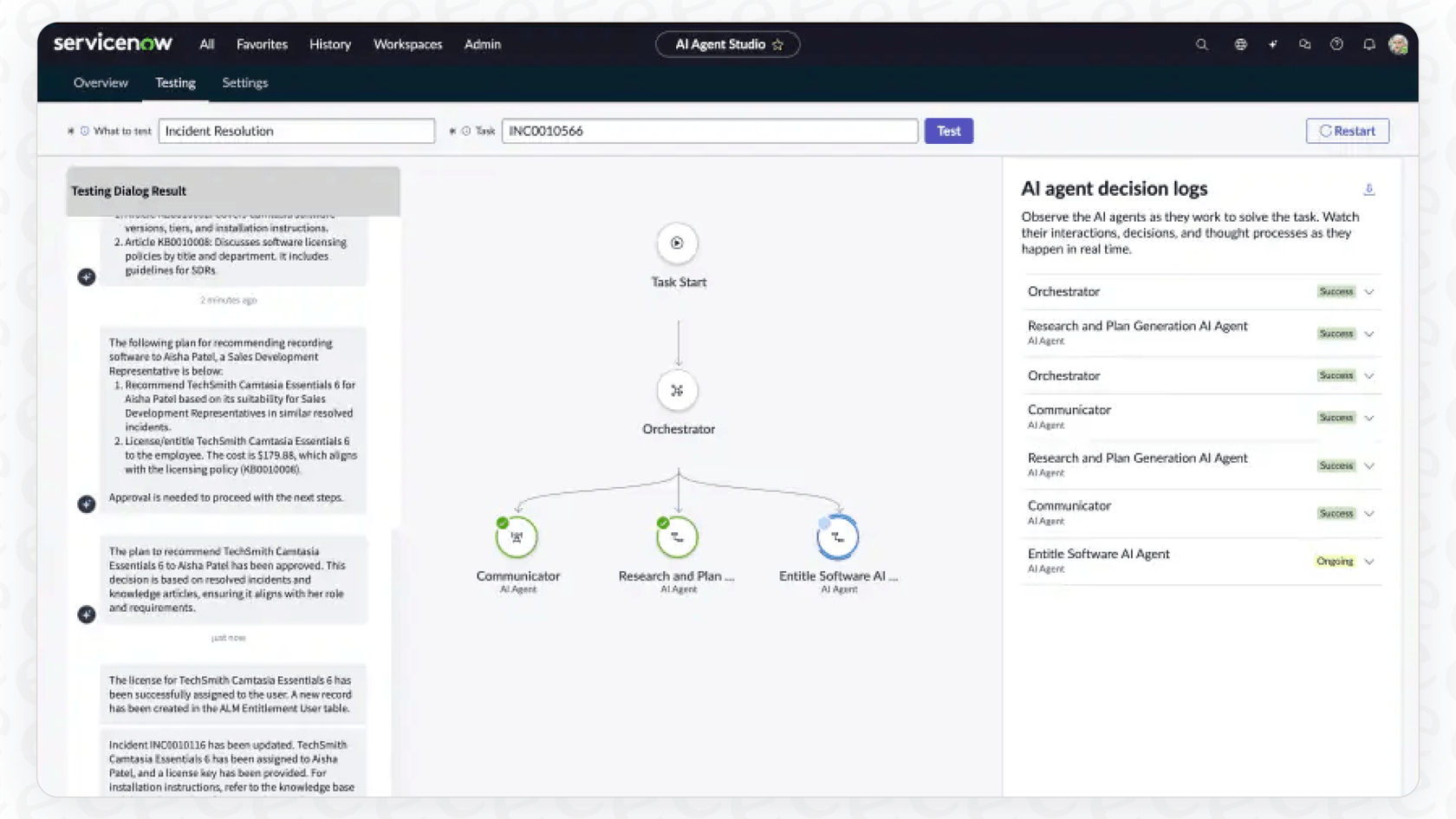
The term "AI agent" is getting thrown around a lot lately, and all the hype can make it tough to figure out what’s real and what’s just marketing. Some companies are just sticking a new label on old automation, while others are building truly independent systems that can think, plan, and act on their own.
ServiceNow is a big name in this area, offering a powerful suite of ServiceNow AI Agents built for large-scale company automation. But are they the right choice for every team?
Let's cut through the jargon and get a straight answer. We'll look at what ServiceNow's AI agents actually are, what makes them tick, where they shine, and the real-world headaches of getting them up and running, like cost and complexity.
What are ServiceNow AI Agents?
At their core, ServiceNow AI Agents are smart software programs that live right inside the ServiceNow platform. They’re built to understand requests, make decisions, and get things done across all sorts of business tasks, from fixing IT issues to managing HR and customer service.
These aren't your average chatbots. They're what you might call "agentic," which is a fancy way of saying they can proactively map out and complete tasks with multiple steps to reach a goal. They don't just answer simple questions. Think of them less like a walking FAQ page and more like a digital teammate that can actually reason its way through a problem.

Because they’re built directly into the ServiceNow world, they work smoothly across all of its different parts. This is a huge plus if your entire company is powered by ServiceNow. But as we’ll see, it’s also a pretty big drawback for everyone else.
Key components of the ServiceNow AI Agents ecosystem
ServiceNow has created a whole world for its agents to live in, complete with studios, orchestrators, and control towers. Let's translate what these technical terms actually mean for you.
AI Agent Studio
ServiceNow advertises its AI Agent Studio as a low-code space where you can build your own AI agents just by describing what you want them to do. The idea is that you can just talk to it in plain English, and the studio will build the agent for you.

In practice, it’s not always that simple. People in developer communities often mention that getting these agents to perform well takes a ton of configuration. The complexity is still there; it just moves from writing code to trying to engineer the perfect prompts and navigating a complicated setup.
AI Agent Orchestrator and Fabric
The AI Agent Orchestrator is basically a manager for your digital workforce. It helps multiple specialized agents, whether they’re from ServiceNow or another company, work together on bigger, more complicated tasks. The AI Agent Fabric is the plumbing that allows them all to communicate.

For a giant corporation, this is incredibly useful. You could have one agent that spots a network problem, another that finds the affected customers in your database, and a third that sends out a heads-up email, all working in sync. But all that coordination means a lot of setup and ongoing management. It's the opposite of a plug-and-play tool.
The AI Control Tower
The AI Control Tower is your main dashboard for keeping an eye on everything your AI agents are doing across the company. It lets you see what they’re up to, how well they're doing, and if they're following the rules.
This kind of oversight is a must-have when you're letting autonomous systems run wild at a large scale. But the fact that you need a whole "control tower" tells you this is a serious, enterprise-level system that needs a dedicated team to keep it running smoothly.
Real-world use cases
When everything is set up just right, ServiceNow AI Agents can handle some seriously impressive tasks across different departments.
-
For IT Operations: An agent can look at a user's frantic, typo-filled support ticket and figure out how to categorize it, check system alerts to predict a server might go down, and even write up a full plan for a system change, complete with rollback steps.
-
For Human Resources: You could have an agent that handles big chunks of the employee onboarding process, like setting up new accounts and ordering laptops, or one that can answer tricky questions about payroll by looking up company policies.
-
For Customer Service (CRM): An agent could automatically find all customers hit by a service outage, write up case summaries so human agents can get up to speed in seconds, and manage a full customer journey like processing a return from start to finish.
graph TD A[Customer submits return request] --> B{AI Agent analyzes request}; B --> C[Agent checks inventory & eligibility]; C --> D[Agent generates return label]; D --> E[Agent schedules pickup]; E --> F[Agent updates CRM with status]; F --> G[Agent notifies customer];
The biggest challenges and limitations
For all their power, ServiceNow's AI tools come with some big hurdles that you'll often hear about from the people actually trying to implement them.
Steep learning curve and complex setup
As we touched on earlier, getting started with ServiceNow AI Agents is no small feat. User comments on forums like Reddit are full of developers describing the platform as being "like teaching a 1 year old to sign opera" and requiring way more configuration than they first thought.
This complexity means it takes a long time to see any real value, and you’ll likely need to lean heavily on expensive consultants or build a dedicated internal team. You’re not just buying a tool; you're kicking off a major, long-term project.
A better way: Instead of platforms that take months to set up, modern solutions like eesel AI are designed so you can get started on your own. You can connect your helpdesk (like Zendesk or Freshdesk) and knowledge sources to go live in minutes, not months, without ever having to sit through a sales demo.
Opaque and expensive pricing
Good luck finding a price tag for ServiceNow AI Agents. ServiceNow keeps its pricing under wraps, meaning you have to go through a long and involved sales process just to get a number.
This lack of transparency can be really frustrating. Unofficial reports from users suggest the cost is "astronomical," with one person mentioning a price of over $800 per person per year. That price point makes it a non-starter for many teams that don't have a massive enterprise budget.
A better way: This approach is a stark contrast to tools that are open about their pricing. For example, eesel AI has clear monthly and annual plans based on the features you need. There are no surprise fees for each ticket resolved, so your bill won't suddenly jump after a busy month.

Platform lock-in and the "rip and replace" problem
The greatest strength of ServiceNow AI Agents, their tight integration with the platform, is also their biggest weakness. They're built to work only inside that bubble. If your business relies on other popular tools like Zendesk, Freshdesk, or Intercom, you’re out of luck unless you're prepared to move your entire operation over to ServiceNow.
This leads to a "rip and replace" dilemma that's expensive, disruptive, and takes forever.
A better way: A more modern and flexible approach is to use AI that connects directly to the tools you already use. With eesel AI, you get one-click integrations for major helpdesks, chat tools like Slack, and knowledge bases like Confluence. That means you can start automating support right away without having to tear down your existing setup.

Performance and rollout uncertainty
Letting an AI loose on your customers without testing it first is a huge gamble. Users often worry about "hallucinations," where the AI makes up incorrect information, and other weird behavior that could sour the customer experience. Without a safe way to see how the agent will perform, you're flying blind.
A better way: You don’t have to take that risk. A solid simulation mode is key to building trust in your AI. For instance, eesel AI lets you safely test your AI agent on thousands of your past support tickets in a private sandbox. This gives you a clear forecast of its performance and how many tickets it can solve before a single customer ever interacts with it.

A simpler, more flexible alternative for AI automation
Enterprise systems like ServiceNow are built for a specific kind of company: one with very deep pockets, a long timeline for implementation, and a willingness to go all-in on a single platform.
But for everyone else, a more nimble, modern alternative can deliver results much more quickly. eesel AI was built to solve the exact problems that plague those big, complicated platforms. It's fast, flexible, transparent, and works with the tools you already know and use.
Here’s a quick comparison:
| Feature | ServiceNow AI Agents | eesel AI |
|---|---|---|
| Setup Time | Weeks to months, requires specialists | Go live in minutes, truly self-serve |
| Integration | Deeply tied to the ServiceNow platform | 100+ one-click integrations (Zendesk, Slack, Confluence, etc.) |
| Pricing Model | Opaque, enterprise contracts | Transparent monthly/annual plans, no per-resolution fees |
| Testing | Limited visibility before deployment | Powerful simulation on historical tickets for risk-free rollout |
| Knowledge Base | Primarily uses data within ServiceNow | Unifies knowledge from any source (docs, past tickets, wikis) |
Are ServiceNow AI Agents right for you?
ServiceNow AI Agents are a powerful, deeply connected solution for large companies that are already all-in on the ServiceNow platform and have the budget and people to manage a complex system. If that sounds like you, they could be a great investment.
However, for most teams looking for flexibility, speed, and reasonable costs, a different path makes more sense. If you want to improve the tools you already have instead of replacing them, and you’d rather get results in days instead of months, then a more agile, self-serve solution is a much better fit. You don't need a massive platform to get amazing results.
Ready to see how fast you can automate support without the enterprise price tag? Set up your first AI agent in minutes with a free trial of eesel AI.
Frequently asked questions
ServiceNow AI Agents are smart software programs within the ServiceNow platform that can understand complex requests, make decisions, and complete multi-step tasks. They act like digital teammates, [automating various business processes from IT support to HR tasks, going beyond simple Q&A.
A major limitation is that ServiceNow AI Agents are deeply integrated with the ServiceNow platform itself. This means they are primarily designed to work within that ecosystem, making seamless integration with external, non-ServiceNow tools challenging without significant effort or a full platform migration.
Implementing ServiceNow AI Agents is a complex undertaking, often taking weeks to months to configure properly. Users frequently report a steep learning curve and the need for extensive setup, sometimes requiring dedicated internal teams or expensive external consultants.
ServiceNow keeps its pricing for ServiceNow AI Agents opaque, requiring a direct sales inquiry. Unofficial reports from users suggest costs can be astronomical, making them suitable mainly for large enterprises with substantial budgets.
The blog highlights that performance and rollout uncertainty are significant concerns for ServiceNow AI Agents, with limited visibility before deployment. Modern alternatives often offer simulation modes that allow you to test agents on historical data in a sandbox environment before customer interaction.
ServiceNow AI Agents are versatile and designed for broad application across various departments. They can streamline IT operations, automate parts of HR processes like onboarding, and enhance customer service by managing complex customer journeys.
Managing ServiceNow AI Agents requires ongoing attention, especially due to their enterprise-level complexity and the need for oversight. The presence of an "AI Control Tower" suggests that a dedicated team or significant internal resources are typically needed to monitor performance and ensure smooth operation.
Share this post

Article by
Kenneth Pangan
Writer and marketer for over ten years, Kenneth Pangan splits his time between history, politics, and art with plenty of interruptions from his dogs demanding attention.







